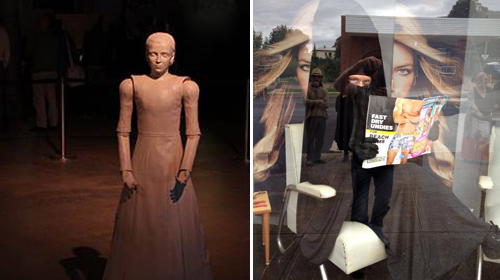Latest News Archive
Please select Category, Year, and then Month to display items
![]()
Prof Marian Tredoux, Associate Professor in the
Department of Geology at the University of the Free State,
recently had a mineral named after her.
Photo: Sonia Small
Prof Marian Tredoux is a geochemist and lecturer in the Department of Geology at the University of the Free State (UFS). Her research interests are rocks, particularly the chemistry of rocks and the minerals they are composed of – chemicals similar to those found in laboratories, although they occur in nature.
Prof Tredoux started her research career at the University of the Witwatersrand (Wits), after which she spent a number of years at the University of Cape Town (UCT). For the past 11 years, she has been at the UFS, which has brought her in close proximity of her primary field-research area in Barberton. This fascinating part of the country has been the focus of her research for 30 years. She has always been intrigued by the earth's crust in this area, which she describes as "very old, very strange, and very interesting".
Prof Tredoux has been collaborating with colleagues and peers overseas in an attempt to unravel the intricacies of this unusual geological area. Some of these colleagues recently discovered a new mineral in one of the rock formations of the Barberton mountain range. They decided to name the mineral after Prof Tredoux, dubbing it tredouxite. "I am very honoured by this, and very grateful that all these years of collaboration are being acknowledged," Prof Tredoux said.
Art2 + x [science] = 2 continents fused
2014-04-02
|

Left: Diamandini by Dr Mari Velonaki. Right: 'Muslim Hairdrying' by Cigdem Aydemir.
|
Mzanzi resistance art is set to fuse with Australian interdisciplinary art in an experimental ‘boiling pot’ – right here on our Bloemfontein Campus.
Program for Innovation in Artform Development (PIAD)
Kovsies and the Vryfees forged a highly-innovative link between South African and Australian artists by establishing the Program for Innovation in Artform Development (PIAD). Together we are embarking on a three-year collaboration to see what happens when experimental and community arts are fused.
The project includes intercultural laboratories, art and science exchange programmes, public forums as well developing and presenting experimental art.
Art(ist)s meet science(tists)
For the first time, two Australian artists will visit our Faculty of Natural and Agricultural Sciences in an exchange programme. The one is Dr Mari Velonaki, director of the Creative Robotics Lab at the University of New South Wales. The other is Dr Nigel Helyer, an honorary research fellow at the SymbioticA biotechnology lab at the University of Western Australia.
Dr Velonaki will explore new links between humans and computers that are community orientated. She will work closely with Prof PJ Blignaut and the Department of Computer Science and Informatics. In turn, Dr Helyer will investigate genetic coding and intercultural musical compositions. He will collaborate with Prof J Albertyn at the Department of Microbial, Biochemical and Food Biotechnology.
Vryfees 2014 and 2015 will also see contemporary and highly-experimental works from renowned Australian artists Cigdem Aydemir and Jess Olivieri. In addition, the festival will present OPENLab – a new national laboratory for early and midcareer artists and creative practitioners interested in making art in the public realm.
The programme is the result of a close partnership between the Vryfees and Situate Art in Festivals, managed by Salamanca Arts Centre in Australia (www.situate.org.au).
It also enjoys the support of:
- Australia Council for the Arts;
- NSW Artists Grant Scheme administrated by the National Association of the Visual Arts LTD;
- Situate Art in Festivals;
- National Lottery Distribution Trust Fund and
- Modern Art Project SA.
For more information on Piad visit www.vryfees.co.za or https://www.facebook.com/pages/PikoPiad/1435158293383474.